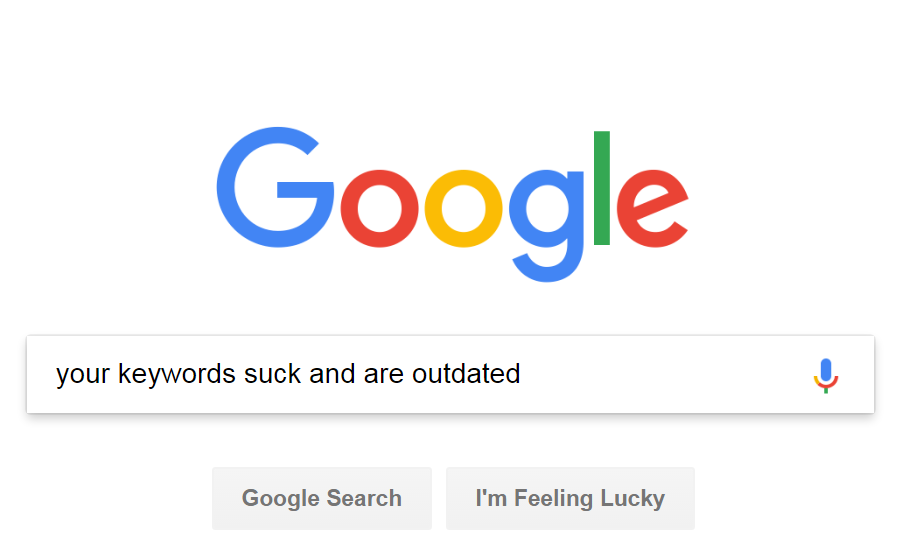Are you using updated keywords for your business?
| filed under: Search, Search Engineering, Search and Content Marketing, Search Engine Optimization, Search Optimization, Search MarketingWhy your keywords suck and are outdated
You probably built your website years ago. You’ve probably never updated your CV, just added your latest jobs and clients to the top. Your corporate bio, what you do, your products and services were probably written back either when your company opened, when you ported your brochures to the web, or the last time you did a major revision. Like I said, probably years ago.
Why does this matter?
If you don’t refer to your services in the same way that others do, you’ll be surprisingly invisible when it comes to your prospects finding you on the Internet. If you don’t add the exact, literal titles, subjects, hashtags, and keywords that people are using to find you and your valuable services, then you won’t be found at all.
As I have said, Google may well be the most sophisticated, intuitive, and relevant search engine going, but there’s a terrible secret that even Google doesn’t want you to know about when it comes to folks searching for and finding you:
Google plays dumb until it needs to be smart.
Literal is quicker & simpler, so know your buzzwords
Google is amazingly, painfully literal and only gets smarter when — and if — it can’t find relevant results that satisfy its customers immediately and easily. When it can’t find what you’re looking for, Google will search its databases for name variation, for light synonyms, and the like. If Google Search doesn’t need to be ingenious, however, then it’ll just be useful, serving only results that explicitly mention the exact keyword strings that the customer shoehorns into search.
Why, you may ask, does it play dumb? Well, being smart is very resource-intensive so if Googleis literal, all it has to do is find a match in it’s cached-and-prepped index. Literal is quicker, simpler, and mostly a better result than when Google tries too hard to be clever. It’s win-win until it doesn’t result in you or your business anywhere to be found. And that’s your fault, man — own up!
When I started in digital, what I did was called new media marketing. Then it became social media marketing, then blogger outreach, then digital PR and digital marketing. Another example is a service I offered which helped balance bad search engine results on Google. I called it defensive SEO then defensive search. Now it’s part of Online Reputation Management (ORM).
Who knows what digital PR and ORM will be called in the future? It’s always evolving and one needs to not only keep up with what the professional wordsmiths and copywriters are calling what we do; we also need to know what sticks, what people adopt, and finally, what the general public calls what you and I do. Knowing the terms that people that are not part of our acronym-loving digital Internet cabal are using is important — we’re very often way too clever for our own good.
So, have you brainstormed recently? Have you interviewed your friends, clients, Mom, Dad, high school mates, wife, husband, kids, and colleagues? Ask them what they would search for if they were involved in a particular situation needing services like yours.
How do I clean bad search results from Google?
Folks don’t often get onto Google with a set of keywords or a professional industry style guide to help them choose the la phrase juste. They’re just writing words into Google as though asking the netherworld for answers via their handy Ouija board or Magic Eight Ball.
So, give it a go and make a schedule. Keep your ear to the ground and be sure to interview prospects to find out what the cutting edge of your industry’s language is, as well as what the long tail of your prospects’ language is. Then make sure that this language is constantly rolled into the already-rich dough that is your businesses Internet and web assets: bios, social media profiles, social network platforms, websites, micro-sites, personal sites, promotional pages, your blog, and Tumblr — everything you can.
And if you do maintain the keyword-based advertising campaigns for yourself and your clients, you need to work on updating your keyword list as well. These strings go stale surprisingly quickly. In fact, I don’t want to waste any more of your time — get going right now!
Good luck and happy hunting!

Contact Chris via email, follow him on Twitter and Google Plus or leave a comment below.

